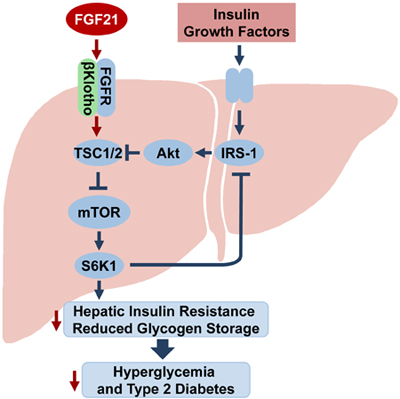
Fibroblast Growth Factor 21 (FGF21) has increasingly gained attention as a novel metabolic regulator. Pharmacological administration or transgenic overexpression of FGF21 has been shown to ameliorate hyperglycemia, hyperinsulinemia and insulin resistance in obese rodents and monkeys. Although pharmacological and physiological studies have demonstrated beneficial functions of FGF21 in the liver, the downstream signaling pathways mediating these activities remain largely unknown.
Base on the recent findings that SIRT1 and RARβ act as potent upstream regulators of FGF21 (Li Y, et al, Gastroenterology, 2014; Li Y, et al, JBC, 2013), a team of scientists led by Professor LI Yu from Institute for Nutritional Sciences, Shanghai Institutes for Biological Sciences, Chinese Academy of Sciences demonstrates that the hepatocyte-derived hormone FGF21 acts as a novel inhibitor of the nutrient sensor mTORC1 complex, and functions as an autocrine/paracrine in the modulation of hepatic insulin sensitivity and glucose homeostasis.
In this study, they utilized pharmacological and genetic approaches to characterize that the mTORC1 complex serves as a novel downstream target of FGF21. These in vivo and in vitro studies illustrate FGF21 inhibits nutrient- and hormonal-induced hepatic mTORC1 activity; Hepatic βKlotho is necessary for FGF21 to inhibit mTORC1 and enhance insulin sensitivity; FGF21 downregulates mTORC1 in a TSC (tuberous sclerosis complex)-dependent manner; FGF21 enhances hepatic insulin sensitivity through mTORC1 inhibition. The FGF21-mediated inhibition of mTORC1 may represent a molecular mechanism by which pharmacological and genetic manipulation of FGF21 ameliorate hepatic insulin resistance, hyperglycemia, and type 2 diabetes.
This work was published in Hepatology on February 29, 2016 as a research article entitled “Fibroblast Growth Factor 21 Improves Hepatic Insulin Sensitivity by Inhibiting Mammalian Target of Rapamycin Complex 1”. This study was funded by the grants from the National Natural Science Foundation of China and the Hundred Talent Program of the Chinese Academy of Sciences.

The proposed model for regulation of hepatic insulin sensitivity by FGF21-βKlotho-mediated inhibition of mTORC1 activation. (Image by Dr. LI Yu’s lab)

86-10-68597521 (day)
86-10-68597289 (night)

52 Sanlihe Rd., Xicheng District,
Beijing, China (100864)

